
[ HOME ]

A traditional country dance tune
Click here to play or download midi file
There are dances called The First of August in both English and Scottish country dancing, but I suspect this tune is likely to be English or Welsh in origin. Actually, I haven't a clue! I'm just going by the style and some references in the literature, as I cannot find an example of the tune anywhere. If any reader knows the origin, I'd love to hear.
This is another piece I collected from Canberra musician and composer, Ian Blake (of Pyewackett fame) - one day I'll ask him where he got it! In the meantime, it's a lovely tune that is easy to play on most folk instruments, so have fun.
Happy Playing, Alan Craig
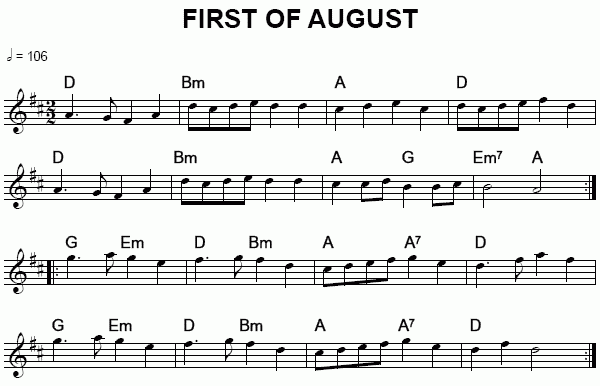
[top]
A traditional piper's tune
Click here to play or download midi file
This Dorian mode jig is part of every highland piper's repertoire, but it's also known in Ireland, England, Cape Breton and Canada. It appeared in Alexander Mackay's collection in 1805 under the title Braes of Glenorchy, though it is sometimes referred to as the Hills of Glenurchie (a misspelling). In Northumbria they know it as The Wild Hills of Wannie and in Ireland there is a version called The Rollicking Boys of Tandaragee.
Whatever it's called, this is a great jig that can also be played as a march (pipe bands often do).
Happy Playing, Alan Craig
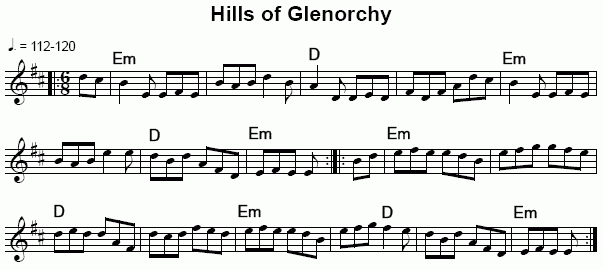
[top]
A traditional tune from Denmark
Click here to play or download midi file
The Fanø Polka is traditional tune from Denmark, quite typical of the fiddle music from that land. Fanø is an island just off the southwest coast of Denmark. I learnt this tune from Ian Blake, originally of Pyewackett, who performs regularly in Europe and has a great wealth of these tunes. Ian now lives in Canberra and is an outstanding musician, orchestrator and performer.
This tune is suitable for most traditional folk instruments, but watch out for the C♯ in the 4th bar of the second part.
Happy Playing, Alan Craig
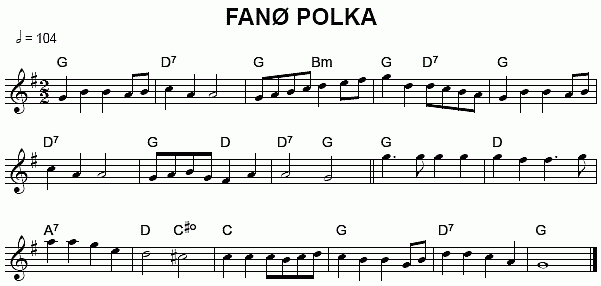
[top]
A Scottish country dance tune
Click here to play or download midi file
The old traditional tune, Petronella, is a specific type of Scottish tune that the Irish like to call a polka (though it's not, as the polka has a specific rhythm of its own). In fact, these country dance tunes are not phrased like the better known reels and are best thought of as tunes in 2/4 rather than 2/2 or 4/4. The tune is, of course, for a Scottish country dance of the same name and can be grouped with tunes like the Dashing White Sergeant, Rose Tree or Davy, Davy, Knick Knacks.
The Petronella is widely played in Scotland, NE England, Donegal (where they call it a 'highland'), and in the American South as a popular old-timey dance. My mothers name was Patronele, and as a kid I used to think the dance was named after her! Of course, it isn't, and is probably no younger than the mid-nineteenth century.
Happy Playing, Alan Craig
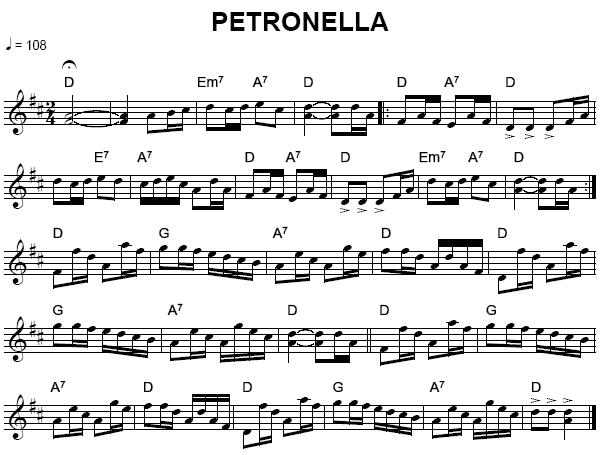
[top]
Northumbrian rant
Click here to play or download midi file
Here is an English dance tune suitable for most folk instruments. The Northumbrian rant is very popular in the North East and has a feeling somewhere between a reel and a hornpipe. The Morpeth Rant was originally composed by William Shield in the 1700s and has had a dance of the same name associated with it for over 200 years. The tune is sometimes called the Ivy League Hornpipe or Jim Clark's and is known in Scotland, Ireland and New England (USA). Earlier printed versions are often in B♭ with a slightly different B part, but I learnt this version from the Canberra fiddler, Bob McInnes.
Happy Playing, Alan Craig
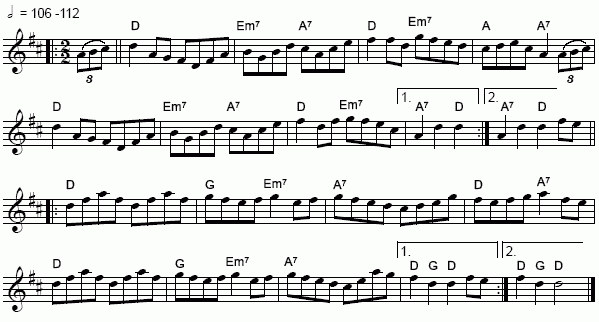
[top]
fiddle/tenor banjo tune
Click here to play or download midi file
I originally wrote this tune as solo break for Rantan's version of Brisbane Ladies, but later included as part of a medley in our Bush Dance! series. A few years later I was chuffed to hear some Melbourne box players ripping into it at a festival. They'd tinkered with a few notes here and there and played it in E minor, which I think suits button box better. Here it is as a fiddle/tenor banjo tune, but I'm afraid it's not a suitable piece for tin whistle in any key!
Happy Playing, Alan Craig
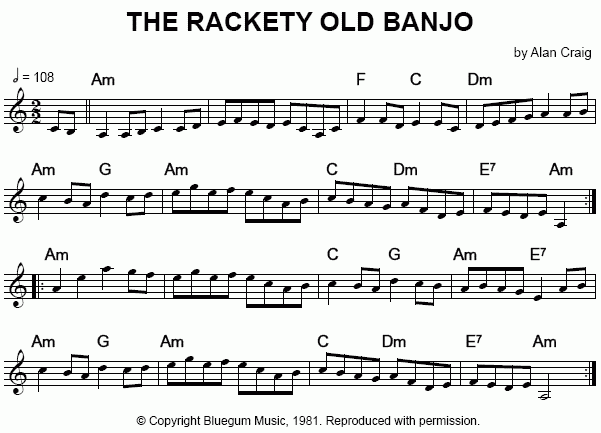
[top]
Muile nam Fuar-bheann Mor
Click here to play or download midi file
This traditional waltz is a quintessential Scottish country dance tune and has been recorded by just about everyone. I've known it since I was a child, and it should be in every folk-dance musician's repertoire.
Note the F chord seven bars from the end. It's not a mistake, but one you wouldn't normally guess. Scottish country dance bands love these little twists and it's what makes their music so special. This is a great traditional Scottish jig that is related to the strathspey Cutting Bracken (Tha Mi Sgith) or Cutting Ferns. It has been recorded by Jimmy Shand and the Cunningham Brothers and is as good a jig as you'll ever find. I learned this version from David South, and the arrangement is from Rantan Bush Band.
Happy Playing, Alan Craig
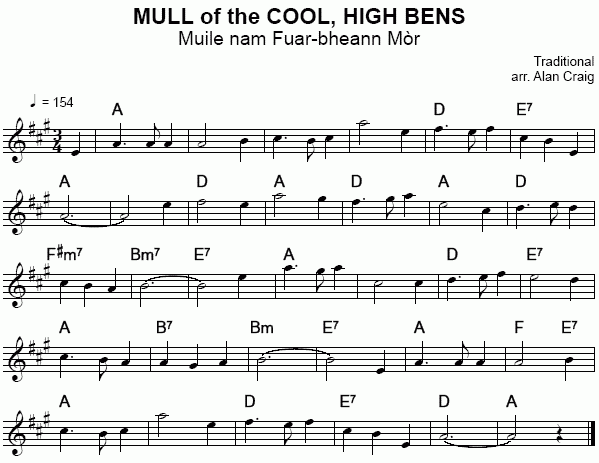
[top]
Scottish jig
Click here to play or download midi file
This is a great traditional Scottish jig that is related to the strathspey Cutting Bracken (Tha Mi Sgith) or Cutting Ferns. It has been recorded by Jimmy Shand and the Cunningham Brothers and is as good a jig as you'll ever find. I learned this version from David South, and the arrangement is from Rantan Bush Band.
Happy Playing, Alan Craig
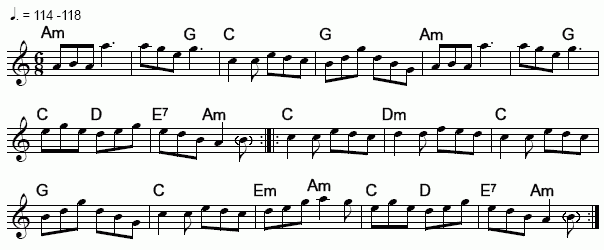
[top]
Click here to play or download midi file
A Scottish country dance tune
Drumley's Reel, sometimes called Drumley's Hornpipe or just plain Drumleys, is a favourite Scottish country dance tune. It is perfect for the Circassian Circle or any other country dance requiring that feel. The tune is traditional and the earliest reference I can find is a recording by Jimmy Shand on a Parlophone 7" EP in 1963, though he may well have recorded it earlier.
I simply cannot remember where I collected this tune, but I have a feeling it may have other titles: so folks, let me know if you have an alternative name for it. It doesn't appear by this name in any of the old Scottish dance music collections I have.
Happy Playing, Alan Craig
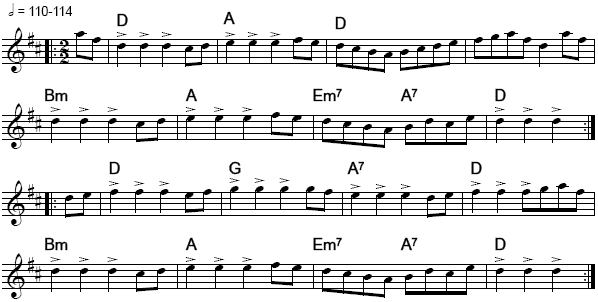
[top]
Click here to play or download midi file
Mrs Peel is almost certainly a composition by 17th century blind harpist Turlough Carolan, but is not one commonly heard. I say almost certainly as there is much confusion about many tunes attributed to Carolan. He is often credited as the author of tunes he never wrote (e.g. Twa Bonnie Maidens known erroneously as George Brabazon II). However, this tune seems firmly in the style he was famous for and there are no other contenders for its authorship.
This is a plaintive air that demands a bit of passion when played. I often like to run down to an A note at the end: this evokes a mixolydian Am chord that seems to resolve more satisfactorily than the dorian Dm. But that is just taste.
Happy Playing, Alan Craig
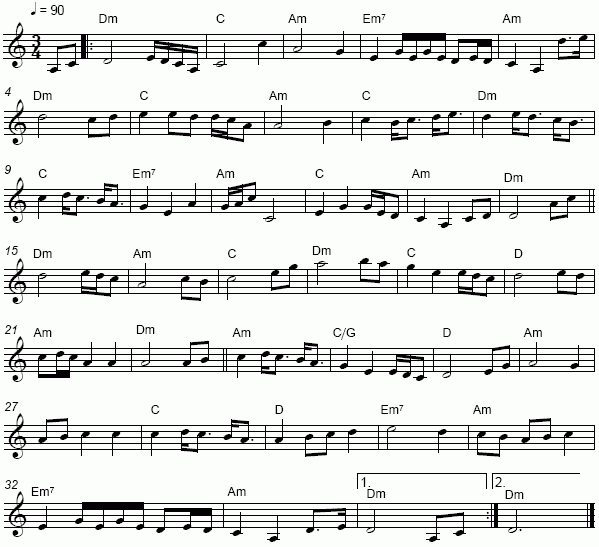
[top]
Words/music by Peter Dobe
Click here to play or download midi file
Preamble:
If the sights and sounds of the city
Seem somehow boring and dull
Head out on the D'Aguilar highway
Some night when the moon is full
Leave Woodford far behind you
Till you come to the town of Kilcoy
And the scene you will see in the moonlight
Will fill you with wonder and joy
Happy Playing, Peter Dobe
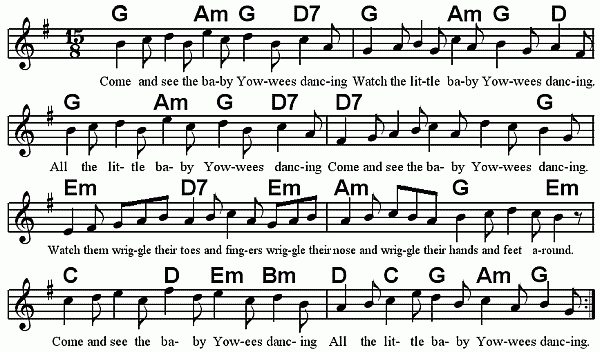
[top]